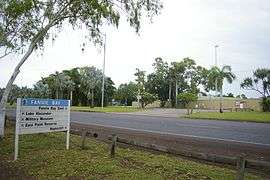Fannie Bay, Northern Territory
| Fannie Bay Darwin, Northern Territory | |||||||||||||
|---|---|---|---|---|---|---|---|---|---|---|---|---|---|
 Fannie Bay, Darwin | |||||||||||||
| Population | 2,640 (2006)[1] | ||||||||||||
| • Density | 573.9/km2 (1,486/sq mi) | ||||||||||||
| Postcode(s) | 0820 | ||||||||||||
| Area | 4.60 km2 (1.8 sq mi) | ||||||||||||
| Location | 4 km (2 mi) from Darwin | ||||||||||||
| LGA(s) | City of Darwin | ||||||||||||
| Territory electorate(s) | Fannie Bay | ||||||||||||
| Federal Division(s) | Solomon | ||||||||||||
| |||||||||||||
Fannie Bay is a middle/inner suburb of the city of Darwin, Northern Territory, Australia.
Situated in the suburb is the Fannie Bay Gaol museum, Fannie Bay Race Track and a monument to Ross Smith, captain of the Vickers Vimy that, in December 1919, was the first aircraft to fly from England to Australia in less than 30 days. Adjoining the suburb is the East Point Reserve, containing Lake Alexander, a Military Museum and gun emplacements from the Second World War.
A great many places in the Northern Territory were named by John McDouall Stuart for members of the Chambers family, who sponsored his expeditions. Fanny (1841–1915) was the eldest daughter of John Chambers.
References
- ↑ Australian Bureau of Statistics (25 October 2007). "Fannie Bay (State Suburb)". 2006 Census QuickStats. Retrieved 19 March 2008.
External links
| ||||||||||||||||||
Coordinates: 12°25′30″S 130°50′11″E / 12.42500°S 130.83639°E
This article is issued from Wikipedia - version of the Sunday, January 31, 2016. The text is available under the Creative Commons Attribution/Share Alike but additional terms may apply for the media files.